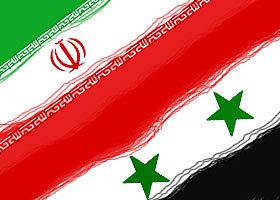Support for Iran's Meeting with Syrian Opposition

This dualism consists of "the issue of a probable war in Syrian borders" and "the wave of calls for democracy in the region". The Islamic Republic of Iran must also take these two points into consideration while moving its foreign policy forward.
Another point of great importance is that Syria is at the forefront of a potential war with Israel and the chance of a war between these countries still exists. Considering that Lebanese resistance groups are influenced by Syria, a crisis and a collapse in Syria is to Israel's advantage from a strategic point of view. Therefore, public opinion in the Arab world seeks some sort of balance and understanding in Syria. On the other hand, Israel is in a hurry to recreate the Libyan situation in Syria and somehow place Syria under Article 42 of the United Nations Charter which deals with punitive measures.
Another issue is the "wave of calls for democracy" in the region. Few regions in the world have as low a level of democracy as the Middle East. In the UN's 2003 Human Development Report, it was emphasized that one of the reasons for the spread of terrorism in the Middle East is the absence of the young generation in the public domain and in the political scene. It was mentioned in this report that one of the reasons for the increase of terrorism and suicide attacks in Muslim countries is the lack of a democratic system which the youth could put their energy into.
Domestic "tyranny" and foreign "arrogance", which lead to some behind-the-scenes deals in issues such as oil, will stabilize western strategies in the region, which then causes the youth to turn to suicide attacks in order to fight against domestic tyrants and foreign arrogance.
In 2004, the US proposed the "Greater Middle East Plan". This plan had two aspects; first, the strategy of "Israeli survival" and this country’s principal role, and second, "democratization" in the region. Of course, this does not mean the arrangement of regional plans by the US, but rather that they had set these issues as priorities in their strategies.
We, too, have to recognize Syria as a reality, and not think that we have entered the scene to maintain and protect Bashar Assad. If Iran shows sensitivity towards Syrian issues as a reality, its entrance to the scene becomes justifiable. That is why I believe that the Islamic Republic of Iran should not have any problem with Syria's opponents. I have, several times, suggested to our Foreign Ministry that we should negotiate with Syria's opponents, because they have common positions and interests with Iran and Iran is not against democracy in Syria. Therefore, we welcome the recent statements made by Mr. Salehi based on negotiations with Syria's opposition forces and such negotiations are necessary.
Negotiations with Syria's opponents means directing the trend of all developments towards the Kofi Annan plan, the goal of which is to establish a transitional government in which the fate of Bashar Assad would be determined. This approach indicates Iran's insistence on "good offices" and it can lead to a plan to assess the trends of developments in Jordan, Bahrain, and Saudi Arabia.
If countries take tangible and transparent positions, then they will not be accused of contradiction and be pushed aside. On this basis, I believe that the Islamic Republic of Iran must follow moderate strategies in Syrian developments.

